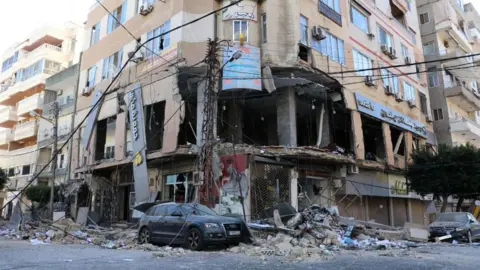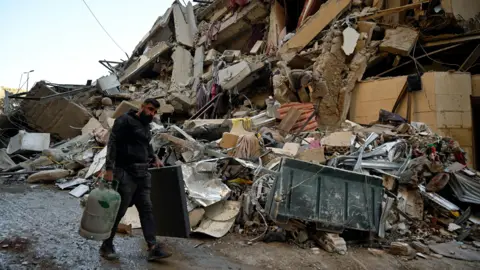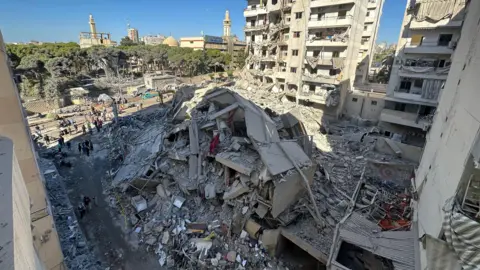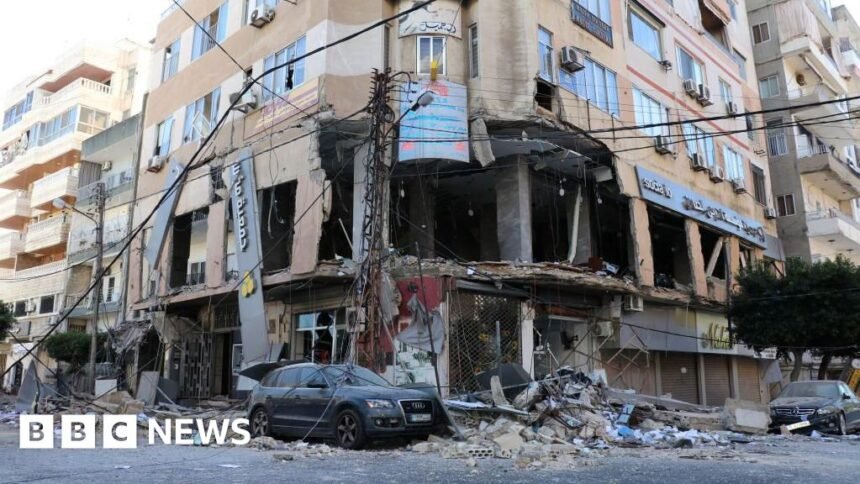 AFP
AFPWhen Israel announced last month it would target a Lebanese micro-lending charity with ties to Hezbollah, it set off a frantic search for a list of the group’s affiliates.
Before Israel began bombing, people across the country were trying to figure out whether they needed to flee their homes where branches were located.
Al-Qard Al-Hassan Association (AQAH), a charity that provides interest-free small loans, has grown in influence over the past decade due to U.S. sanctions and the collapse of Lebanon’s banking sector.
Hassan lives with his family in Beirut, 200m (655 feet) from the AQAH branch.
“We heard about this from this man Avichay,” he said, referring to the Israeli army’s Arabic-speaking spokesman Avichay Adraee, who announced on social media An evacuation order was issued.
“Then the explosion started [the southern Beirut suburb of] Dahiye. We could hear: “Boom, boom, boom.” The kids jumped every time they heard the ‘boom’ sound.
With nowhere to go, Hassan took his family to the beach, where they spent a sleepless night huddled in the car.
That night, the Israeli air force attacked about 30 AQAH branches, but the branch near Hassan’s home survived, and he returned the next morning.
As part of its operations in Lebanon, Israel has been cracking down on a number of civil society groups linked to Hezbollah.
In addition to AQAH, it also attacked the Hezbollah-funded Islamic Health Society (IHS), which operates emergency services, hospitals and medical centers across the county. It also attacked its search and rescue teams, killing dozens of rescuers. Israel claims Hezbollah “used IHS as a cover for terrorist activities” and that those killed were carrying out military missions – but IHS denies this.
Israel has also attacked buildings housing people displaced by bombings and evacuation orders.
Such attacks have fueled widespread suspicion in Lebanon that Israel is targeting civilians who support Hezbollah – widely known here as Hezbollah’s “bi’a”, a word that literally means “environment” and is thought to be Refers to the social basis of the group.
This is a community of hundreds of thousands of Lebanese who support the party, vote for it, are employed by various civil organizations affiliated with the party, or are relatives of Hezbollah fighters and members.
Hezbollah’s ties to this social base – largely concentrated in the Shia-majority south, the eastern Bekaa Valley and Beirut’s southern suburbs – have long been considered a source of the group’s strength.
But it also puts it in the crosshairs of Hezbollah’s enemies.
Israel says AQAH funds Hezbollah’s military activities, but Hezbollah denies this and says it has no role other than providing small, interest-free loans to ordinary Lebanese people, in compliance with Islamic law’s prohibition on charging interest. regulations.
After the attack on the AQAH chapter last month, the then-Israeli defense minister said on X that Israel was “destroying the ability of terrorist groups to launch and purchase missiles.”
From an international humanitarian law perspective, experts say AQAH is not a legitimate military target despite Israel’s claims of a role in funding Hezbollah.
“International humanitarian law does not allow attacks on an adversary’s economic or financial infrastructure, even if that infrastructure indirectly supports its military activities,” said Ben Saul, the UN Special Rapporteur on human rights and counter-terrorism.
Saul said the bombing “eliminated the distinction between civilian objects and military targets” and “opened the door to a ‘total war’ against civilians.”
 U.S. Environmental Protection Agency
U.S. Environmental Protection AgencySo what does Israel hope to achieve by bombing civil society organizations linked to Hezbollah?
Amal Saad, a lecturer in politics and international relations at Cardiff University and a leading expert on Hezbollah, believes that the purpose of these attacks is to dismantle Hezbollah’s “resistance groups.”
“Hezbollah is probably the second largest employer after the state,” Ms. Saad said. “Its civil institutions affect hundreds of thousands of Lebanese, mainly Shiites. It is a way to further stifle the community.
This is not the first time Hezbollah’s social base has come under attack. In the last war between Israel and Hezbollah in 2006, Israel razed the neighborhoods of Dasheh, and two years later it developed a military strategy based on the experience – which came to be known as “Dasheh”. doctrine”.
This view was first raised in 2008 by Major General Gadi Eizenkot, then commander of the Israeli army’s Northern Command. The doctrine – as it came to be called – called for the use of “disproportionate force” against civilian areas that Israel believed were under attack, with the aim of forcing the Lebanese people to turn to Hezbollah in order to weaken support for it.
“From our perspective, these are military bases…” he said at the time. “Harming people is the only way to limit [Hassan] Nasrallah,” he said, referring to the then leader of Hezbollah. Nasrallah was killed in an airstrike in Dahiya in September 2024.
Now, in addition to attacking Hezbollah’s network of civilian organizations, Israel is also targeting residents in areas far away from the fighting, such as Vardaniya, northeast of Sidon.
In response to the BBC, the IDF said its “actions were directed only against the Hezbollah terrorist organization and not against the Lebanese population or medical facilities, and therefore a number of measures were taken to mitigate harm to civilians”.
“The IDF’s actions are based on extensive intelligence gathering and strictly in accordance with international law,” the statement added.
 U.S. Environmental Protection Agency
U.S. Environmental Protection AgencyAQAH is just one of several groups linked to Hezbollah that provide a lifeline to hundreds of thousands of Lebanese, especially those who make up the movement’s base.
Its story is intertwined with Lebanon’s financial and economic collapse.
The company was founded in the early 1980s and provides loans to families and newlyweds to help them meet their different personal needs. Recently, the association has also started providing loans for agricultural projects and projects such as solar panels.
The United States imposed sanctions on AQAH in 2007, saying Hezbollah used the group “as a front to manage its financial activities.”
It came into the spotlight again in August 2019, when the U.S. Treasury Department sanctioned Jamal Trust Bank, claiming the bank “knowingly facilitated the banking activities of U.S. designated entities openly affiliated with Hezbollah,” including AQAH. Less than three weeks later, the bank was forced to close.
But the combination of U.S. sanctions and the collapse of Lebanon’s banking sector in October 2019 caused the association to grow at an unprecedented pace. As the United States imposes sanctions on individuals and entities linked to Hezbollah, Lebanese banks have closed the accounts of people they suspect may cause trouble for the U.S. Treasury Department. Many of them gave their money to AQAH.
Then, as Lebanese banks seized people’s savings due to the financial and economic collapse of 2019, trust in the banking system collapsed and more people deposited their money there.
AQAH ended up supporting many Lebanese who had been driven out of the financial system by U.S. sanctions, and many more who had nowhere to park their savings after the economic collapse.
 Reuters
ReutersMany of them would join the estimated one million displaced people scattered across Lebanon today, mostly from the south, the Bekaa and the southern suburbs of Beirut.
Many of them are huddled in government-run shelters and empty buildings. They watched helplessly as most of their villages and cities were destroyed by Israeli forces.
Those whose homes remained intact live in fear of the next wave of bombings, while those who had deposits with AQAH now fear their savings are gone when they need them most.
The displaced themselves have also been bombarded, in areas far from the war zone – such as in the majority Christian northern village of Aitu, where 23 people were killed in an airstrike last month – and increasingly in host communities across the country. Even more unsettling; no one knows when or where Israel might launch an attack.
Meanwhile, in the south, Hezbollah and Israeli forces have been in direct conflict for a month since Israel invaded southern Lebanon in early October.
Regardless of how the fighting on the ground develops, Israel is exerting pressure on Lebanese society as a whole by attacking civil institutions such as AQAH.
Some believe that such attacks may be part of a strategy aimed at destroying the fabric of Lebanese society and transforming the country into an environment hostile to Hezbollah and its “resistance groups”.


